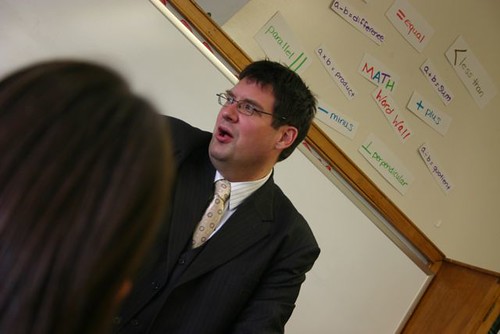Like most others fans of web tools in education, I have enjoyed the fact that most of these tools have been provided for free. The price is certainly right – or is it?
As noted by many, free is not a sustainable economic model. These tools require support in terms of technology, ideas and people. Many are funded by investors hoping to strike it rich with the next Facebook, others are supported by dedicated individuals who are holding things together on a shoestring. Sylvia Martinez had a great post on picking the web 2.0 winners over on her Generation Yes blog recently.
The trouble is, we have had such a trip on the free web highway that we buck when we are asked to start paying tolls. We saw this again this week when Edublogs users – including myself – began to see Google Ads showing up on their blogs. Up to this point, Edublogs had promoted itself as an ad-free, education – friendly platform.
My network was all a twitter this week with many complaining about Edublogs’ move. Most were upset that their screen real estate was now shared with Google ads, while other cried foul about the loss of storage space and features. While I would love to continue to get free service, I also realize that if we (I) want Edublogs to provide a healthy blog alternative to Google’s Blogger then someone had to pay for it, and that someone would be users.
There are other alternatives. Classblogmeister and the new 21 Classes both offer free, educationally focused blog platforms, but in the long term can we really expect them to support the demand of the emerging edublogging hoard? Frankly, and with all due respect to the fine people involved in both these endeavours, I thnk we will get what we pay for.
 Which brings me back to Edublogs. Granted, there have been some service interruptions in the past year. They’ve moved from small time to a larger service with very limited visible sources of revenue. The question is, if they were able to do this all with limited resources, what kind of service can they provide with our (users) support? I am willing and interested in finding out.
Which brings me back to Edublogs. Granted, there have been some service interruptions in the past year. They’ve moved from small time to a larger service with very limited visible sources of revenue. The question is, if they were able to do this all with limited resources, what kind of service can they provide with our (users) support? I am willing and interested in finding out.
I know that for many teachers, we are simply out there doing what we do on our own. Certainly few schools would be willing to ante up the ~US$50 a year supporter fee (which includes 5GB file storage and many feature upgrades), leaving teachers to foot the bill. This is, unfortunately, the reality of an educational environment that has yet to embrace the power of the web for learning on a widespread level.
That leaves teachers to foot the bill on their own. Many of them already spend hundreds of dollars a year to buy materials for their classrooms. Should this become an extra, expected burden?
In my current position, my blog is more of a professional investment, an on-line portfolio of sorts, that I am convinced is of enough value that I have become an Edublogs supporter. They have earned my initial investment and a year from now, I’ll be able to reevaluate the value of the fee. Until then I’ll be proud to put my money where my mouth – and my blog – is.
Let’s keep the blog lights burning.
Technorati tags: technology, education, whipple, learning, edublogs
Photo credit: Lamps, uploaded to Flickr July 2008 by Jeff Whipple.

 Over the past couple of years I have had the opportunity to share, converse and reflect upon ideas from many individuals and information sources within my own Personal Learning Network (PLN). During our time together, I challenged our staff to continually ask themselves three broad, yet critical, questions as they plan, deliver and assess their teaching and learning in 2009.
Over the past couple of years I have had the opportunity to share, converse and reflect upon ideas from many individuals and information sources within my own Personal Learning Network (PLN). During our time together, I challenged our staff to continually ask themselves three broad, yet critical, questions as they plan, deliver and assess their teaching and learning in 2009. Kelly has done much in two years to start conversations in many areas. Like most people, he has been caught up in the fascination of comparing the standardized student assessments with those of other jurisdictions and a few other conversations in which I don’t care to engage, but he has also gone where few politicians have dared (or been capable of) to tread. Unlike many of his colleagues and predecessors, Kelly gets it. He understands that the world has shifted, and that our schools are no longer serving our societies in general.
Kelly has done much in two years to start conversations in many areas. Like most people, he has been caught up in the fascination of comparing the standardized student assessments with those of other jurisdictions and a few other conversations in which I don’t care to engage, but he has also gone where few politicians have dared (or been capable of) to tread. Unlike many of his colleagues and predecessors, Kelly gets it. He understands that the world has shifted, and that our schools are no longer serving our societies in general. However, the real gem for educators is the ever-popular
However, the real gem for educators is the ever-popular  Which brings me back to Edublogs. Granted, there have been some service interruptions in the past year. They’ve moved from small time to a larger service with very limited visible sources of revenue. The question is, if they were able to do this all with limited resources, what kind of service can they provide with our (users) support? I am willing and interested in finding out.
Which brings me back to Edublogs. Granted, there have been some service interruptions in the past year. They’ve moved from small time to a larger service with very limited visible sources of revenue. The question is, if they were able to do this all with limited resources, what kind of service can they provide with our (users) support? I am willing and interested in finding out. Chris, on the other hand, proposes that schools should be putting their resources into digital inftrastructure and hosting these tools themselves. He says that as these unsustainable tools come and go, so goes with it the legacy and student-produced content.
Chris, on the other hand, proposes that schools should be putting their resources into digital inftrastructure and hosting these tools themselves. He says that as these unsustainable tools come and go, so goes with it the legacy and student-produced content. Since then, I have realized the power of connecting and networking. I go to conferences for many reasons; but the primary focus is on learning through conversations and developing professional relationships that I can leverage later for student collaborative learning projects. Two years ago I left Memphis pumped and phoned my boss from Chicago on the way home. I told him I would not return alone; that more teachers needed and deserved this experience. He agreed. Last year we had 8 teachers attend.
Since then, I have realized the power of connecting and networking. I go to conferences for many reasons; but the primary focus is on learning through conversations and developing professional relationships that I can leverage later for student collaborative learning projects. Two years ago I left Memphis pumped and phoned my boss from Chicago on the way home. I told him I would not return alone; that more teachers needed and deserved this experience. He agreed. Last year we had 8 teachers attend.